Risk Assessments: Why Is It So Hard?
Guest blogger: Tracey Longbottom
If you’ve ever wondered why risk assessments feel like an uphill battle in your law firm, you’re not alone. Despite being fundamental to legal practice, risk assessments remain one of the most challenging aspects of compliance for many firms. So what’s making it so difficult?
The Triple Challenge
The problem isn’t just one thing – it’s a perfect storm of three interconnected issues that create a compliance nightmare.
The Policy Gap sits at the heart of the matter. While compliance policies tell law firms what they should do to assess client and matter risk, they fail to define clear digital processes or measurable outcomes. It’s like being given a destination without a map.
Tick Box Culture compounds this problem. The SRA demands that assessments are completed systematically with a holistic view of risk, yet provides tick-box templates that drive offline, non-digital practices. This creates a disconnect between the regulator’s expectations and the tools they provide.
The Frankenstein Tech-Stack completes the trilogy of challenges. Most law firms rely on multiple applications built on legacy technology, with disconnected processes and unstructured data that make it nearly impossible to join the dots and see the bigger picture.
A Fundamental Misunderstanding
Perhaps we need to rethink what we mean by ‘Risk Assessment’ entirely. The term doesn’t fully capture the broader strategic value this thinking brings to a business. The real challenge lies in translating risk insights into practical, actionable behaviours for lawyers.
The Technology Evolution Gap
The legal tech landscape has evolved dramatically. In 2020, biometrics became more accessible for validating identity without office visits. Between 2020-25, open banking adoption soared, providing stronger data and deeper context for source of funds verification. March 2021 saw HMLR pushing law firms toward NFC-enabled apps for passport validation through Safe Harbour requirements.
Yet despite these technological advances, risk assessment processes largely remained static. Simply throwing AML tech at the problem won’t fix the underlying issues.
Beyond Checklists: Driving Robust Judgments
Risk assessments should be opportunities for lawyers to apply commercial, ethical, and strategic judgment – not just compliance exercises. When done properly, they:
- Support the trusted adviser role – clients expect more than just legal accuracy
- Strengthen firm reputation – consistent, well-judged risk calls build credibility and trust
- Enable strategic decision-making – robust judgments help clients make informed decisions
- Drive internal consistency – principled judgment across the firm ensures a consistent, risk-aware culture
Making It Audit-Ready
The ultimate test isn’t just completing the assessment – it’s being able to recreate your thinking when the SRA asks questions later. This requires a simple but effective approach: say what you do, do what you say, and record everything properly.
Best Practice Recommendations
To transform your risk assessment process, focus on six key areas: give teams instant access to risk policies, update policies promptly to meet regulatory changes, ensure training reflects your specific policies, work with trusted data and technology providers, move from reactive to proactive approaches, and create a single source of truth for risk assessment results.
Risk assessments don’t have to be the compliance headache they’ve become. With the right approach, technology, and mindset, they can become powerful tools for strategic decision-making and client service excellence.
Forsyte specialises in transforming compliance from a cost centre into a strategic asset, helping law firms digitise and streamline their risk assessment workflows before inefficiencies become real risks.
 Contact Tracey Longbottom today to discover how your firm can benefit from smarter, more efficient compliance processes:
Contact Tracey Longbottom today to discover how your firm can benefit from smarter, more efficient compliance processes:
Tracey Longbottom
Email: tracey@forsyte.co
Phone: 07951 468472
Interested in a confidential chat?
If you are considering outsourcing your legal cashiering, or just want to find out how it works, our team is here to help.
Cashroom provides expert outsourced account services for law firms including legal cashiering, management accounts and payroll services. Our mission is to fee lawyers from the complexities of legal accounting by supporting the industry with accurate management information and allowing lawyers to do what they do best – practice law.
“I’ve been a client of Cashroom for over 10 years and couldn’t fault the service. When I started the firm, I had basic knowledge of compliance and bookkeeping but didn’t feel confident managing it myself. Cashroom took that weight off my shoulders and provided an invaluable resource I wouldn’t have been able to afford in-house.”



